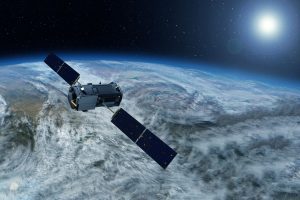New information, though patchy, suggests that Russia is planning to put in orbit either a nuclear-powered military satellite or even a nuclear explosive device. The information was revealed through the U.S. Congress.
The chair of the U.S. House Intelligence Committee, Representative Mike Turner (R-Ohio) in a statement on February 14 said that the “House Permanent Select Committee on Intelligence has made available to all Members of Congress information concerning a serious national security threat.” He did not reveal any additional detail about the threat, but the statement said that he has requested President Joe Biden to declassify the information “so that Congress, the Administration, and our allies can openly discuss the actions necessary to respond to this threat.”
Media reports noted that Turner was reportedly “referring to Russian effort to field a nuclear weapon in space that could take out satellites that serve as a crucial backbone for U.S. civilian communications, navigation, military operations and intelligence gathering.”
The latest reporting indicate that Russia is developing an electromagnetic pulse (EMP) with a nuclear explosion. A media report citing three unnamed sources who are familiar with the U.S. intelligence told CNN that Russia is “trying to develop a nuclear space weapon that would destroy satellites by creating a massive energy wave when detonated, potentially crippling a vast swath of the commercial and government satellites that the world below depends on to talk on cell phones, pay bills, and surf the internet.” A nuclear EMP would destroy and make large swathe of orbital real estate unusable for several years due to all the debris from a large number of satellites destroyed by the EMP. Deploying such a weapon itself would be a major violation of the Russian commitments under the 1967 Outer Space Treaty (OST).
Earlier, White House National Security Council spokesperson John Kirby clarified during a press briefing that Turner’s concern “is related to an anti-satellite capability that Russia is developing.” He also confirmed that it “is not an active capability that’s been deployed. And though Russia’s pursuit of this particular capability is troubling, there is no immediate threat to anyone’s safety.”
According to Kirby, Biden, who has been briefed on this, has “directed a series of initial actions, including additional briefings to congressional leaders, direct diplomatic engagement with Russia, with our allies and our partners as well, and with other countries around the world who have interests at stake.” But declassifying information is done through a certain process and therefore, details may not be released publicly in the near future.
Kirby said that the U.S. National Security Advisor Jake Sullivan is interacting with House leadership and committee chairs on the threat and the latest analysis of it.
Similarly, Secretary of State Antony Blinken also told the media, “This is not an active capability, but it is a potential one that we’re taking very, very seriously. And I would expect that we’ll have more to say soon, in fact very soon, so stay tuned for that.”
Meanwhile, Russia dismissed these claims, saying that the United States is playing “tricks” and that the report is a “malicious fabrication.”
There is not a lot of confirmed information in the open, so we are dealing with many unknowns. As Jessica West, a space security analyst at Ploughshares Canada, pointed out in a tweet, “possible combination of nuclear (power) + space + weapons” does bring with it serious concerns. Many space security analysts contend that the threat is unlikely to be a nuclear warhead, but may possibly be a nuclear-powered device that can attack other satellites. Possibilities could include jammers, weapons to blind image sensors, and electromagnetic pulses (EMPs) that can all damage or destroy satellites.
However, a Washington Post report, quoting two U.S. officials familiar with the intelligence, said that the Russian capability “is a nuclear-armed – not a nuclear-powered – weapon.” If so, this is an escalatory threshold that must not be crossed. The destruction such a weapon would bring about could make space inaccessible even in the medium term.
Deployment of a nuclear explosive would of course break several of the Russian commitments to keeping space as a peaceful domain. This would be a significant violation of Russian obligations under the Outer Space Treaty of 1967, though this assumes that Russia cares about or considers the international ramifications of its actions. This would essentially mean killing of the Treaty that has, by and large, managed to maintain the sanctity of outer space as a peaceful domain.
This is far more dangerous than any recent development, even in the context of states breaking unwritten moratoriums and norms that had prevailed for a long time. Breaking norms is easy, but getting states back to complying with those norms that they have violated is a lot harder. For example, if other major space powers followed Russia’s example, the situation may be difficult to recover.
Breaking norms and setting in motion a new destructive activity would trigger reactions and responses that may lead to further escalation. To give a concrete example: The norm to not test ASAT weapons had prevailed since the mid-1980s, but was broken by China with its first successful ASAT test in January 2007. Another example is the norm to not interfere in each other’s satellite functioning, but this too has been repeatedly broken through any number of electronic and cyber warfare incidents.
Instead of helping build the much-needed consensus for developing new rules of the road to regulate the kind of activities states engage in, Russia is busy breaking the existing norms, treaties, and other global measures. Bringing the nuclear element into space, be it a nuclear weapon or a nuclear-powered counterspace weapon, will have serious repercussions for space utilization. Russia’s own ability to use space will be hampered if it goes down this slippery path.

































